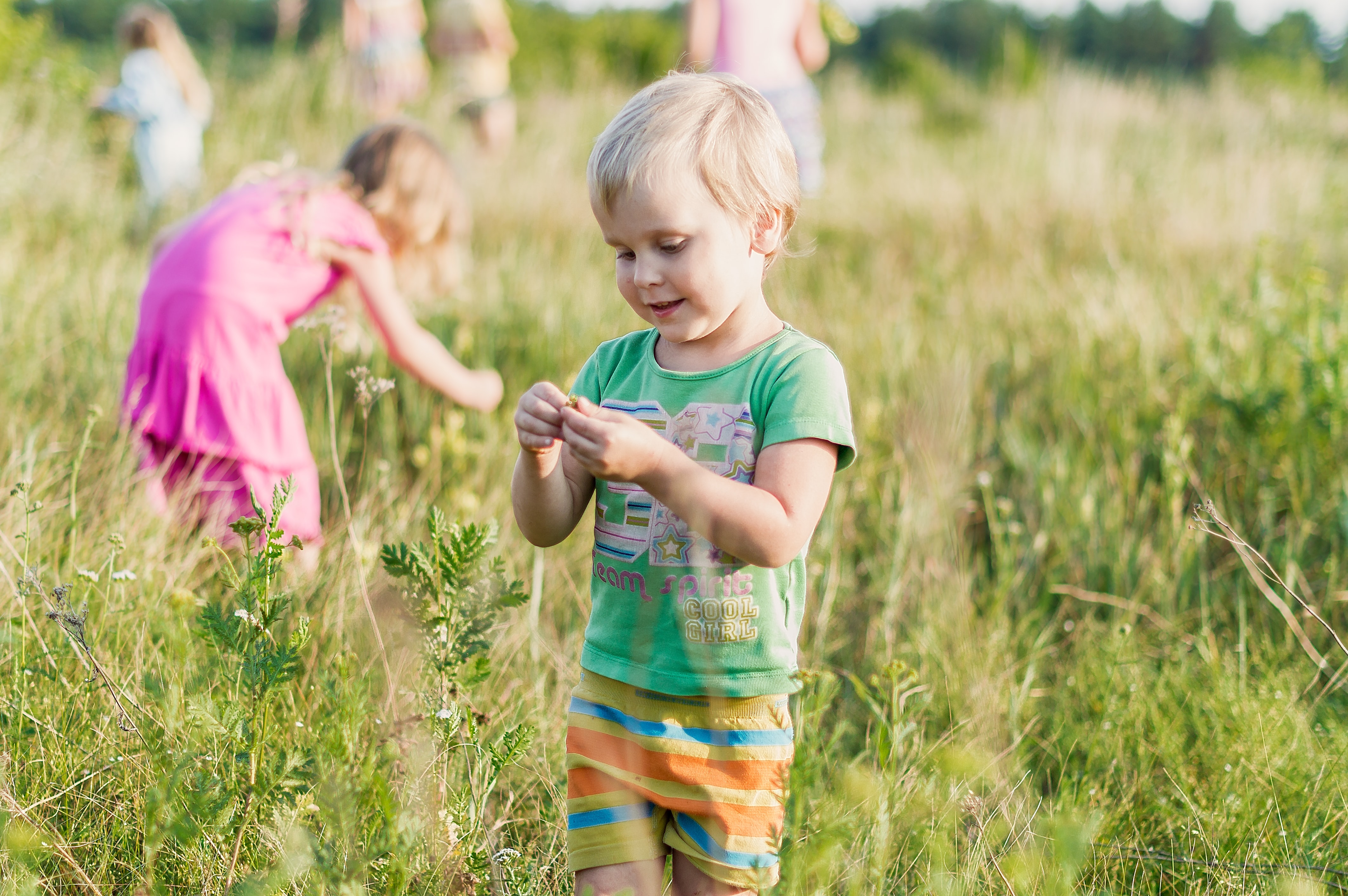People have been spending so much time indoors because of the pandemic. Now that spring is here, it’s time to take advantage of the warm weather and enjoy the outdoors. The skies are blue, the sun is shining, the grass is green… and your child’s got the sniffles. Sound familiar? Spring may be a beautiful time of year, but it is also allergy season. Tree and grass pollen proliferate in the spring, making allergy sufferers reluctant to open a window or go outside.
But before you reach for pharmaceutical treatments such as antihistamines and allergy shots, did you know that there are gentler and more holistic options? While this may not be what you had in mind for relieving allergies, studies have shown that probiotics help to reduce allergy symptoms by regulating your body’s immune response—and may be the key to overall health!
What is the Microbiome?
Despite the microbiome being one of the body’s most complex and important systems, it is also one of the most mysterious. In fact, the study of microbiota and the term “microbiome" was only coined in 2001, and has since rapidly evolved into a burgeoning field of research. The results so far have challenged our understanding of whole-body health and wellness as we know it. Today, probiotics are indicated to support everything from healthy skin to obesity, digestion, immunity and behavioural disorders. How could all these be connected? It all has to do with microbiome function and the gut-brain-heart connection (more on this below).
The microbiome is essentially a network of microorganisms that are concentrated largely in the intestines, consisting of microbes that are both harmful (pathogenic) and beneficial (symbiotic). This is known as the microbiota, and it plays key roles in providing nutrients to our cells, modulating the immune system, and preventing harmful microbes such as bacteria and viruses from running amok and causing a wide array of health issues.
It's all about balance. In a healthy body, pathogenic and symbiotic microbiota coexist. But when the balance is disturbed by illness, poor diet, antibiotics and other lifestyle factors, the body becomes vulnerable to pathogens and disease. This is where probiotics (good bacteria!) come in. By providing a consistent amount of beneficial bacteria you can balance and support a healthy microbiome.
Learn more about the microbiome and your child here.
Do Probiotics Work?
A common denominator for “whole-body health" at every stage of life is probiotics. We say whole-body because scientists have discovered that the gastrointestinal, brain/central nervous system and heart systems are closely linked. These systems communicate with and impact the others to such a degree that the gut has even been called "the second brain”.
While these and other studies about the microbiome and probiotics are fascinating, it can be a little confusing to navigate all the information and find what you need. Fortunately, we've consulted the experts to help understand the role of the microbiome in modulating the body's inflammatory response, immune system and overall health. And of course, how to manage those pesky allergy symptoms naturally! Here’s what they have to say.
The Importance of Probiotics for Kids
Some of the benefits of probiotics for children include helping with eczema/rashy skin, supporting healthy immune system function (70% of the body’s immune cells reside in the gut!), digestive functioning, and a host of other benefits. Ensuring your child's microbiome maintains an adequate balance of probiotics is especially important, and creates a solid foundation for healthy living.
Clinical pharmacist Dr. James LaValle explains: “The beneficial human strains naturally found in your gut don’t simply combat pathogens. They also help your body synthesize vitamins, absorb nutrients, help with detoxification and environmental pollutants as well as hormones […] and they interact directly with your immune system to improve your overall health.”
When do Seasonal Allergies Start?
Seasonal allergies, also known as “hay fever” or “allergic rhinitis” result from exposure to airborne substances that appear during certain times of the year. The most common culprits for seasonal allergies are pollens, mold spores and grasses. Depending on where you live, pollens may also vary by the season. Sometimes they can start as early as December, but in most parts of North America, seasonal allergy symptoms start in the early spring (with pollens from trees) through summer (grasses and weeds) and to late fall (ragweed).

Seasonal allergies can start at any age, so if your child suddenly has a sneezing fit after running through a field of weeds, it may be that they have developed allergies. Furthermore, symptoms can come on suddenly, and last as long as they are continuously exposed to the allergens. It can be hard to discern whether your child's runny nose is the result of allergies or a cold, but if you find they develop “colds” around the same time every year, seasonal allergies may be to blame. When in doubt - especially in these cautious times - always consult your healthcare provider.
Allergies to Pollen
“Achoo!”
It’s that time of year. For millions of allergy sufferers, the warmth, sunshine and flowers in spring also bring unwelcome allergy triggers. If your child is sneezing, congested, or has a runny nose or itchy eyes, hay fever caused by tree pollens in the spring may be to blame. Remember, an allergy occurs when the immune system reacts to a foreign substance that is usually harmless as an invader and releases chemicals and proteins including histamines to protect against it. This overreaction, or hypersensitivity of the immune system, results in allergy symptoms such as the following:
Allergies and Sore Throat
Along with sneezing, itchy eyes, runny nose and congestion, another common side effect of seasonal allergies is a sore throat. To make matters worse, the mucous produced by a runny nose can lead to post-nasal drip, which can further irritate and inflame your throat. No wonder your child is feeling so crummy from all those sniffles!
Allergies with Headache
Nasal and sinus congestion caused by allergies can also trigger allergy headaches. This usually takes the form of pain localized over the sinus area (known as sinus headaches) and in severe cases can lead to a migraine.
The Connection Between Microbiota and Allergies
While we know when and how allergies occur, there's another interesting piece of the puzzle to examine: the link between gut microbiota (those “good” and "bad" microbes we talked about) and allergies. Several studies have looked at differences in the gut microbiota of allergic and non-allergic children and found that low gut microbial diversity is linked to increased allergic inflammation. Furthermore, immunologists have suggested that the microbiome should be considered a therapeutic target for treating inflammatory diseases, such as allergies. In other words, exposure to good bacteria, whether through food, the natural environment or supplementation will help alter the allergic response and the severity of allergic symptoms.
Treatment for Seasonal Allergies
Seasonal allergies are more than just a seasonal nuisance. Allergies not only impact your child’s well-being, but allergic rhinitis is associated with moodiness and irritability, decreased concentration and focus, limited activities, fatigue, sleep disorders and more. It’s just one of the reasons why finding gentle and effective treatments is so important!

There are preventative measures you can take to limit exposure to allergens, such as keeping windows closed, keeping track of pollen counts, staying indoors as much as possible when counts are high, and changing your children out of their outdoor clothes when they come inside. But let's face it, avoidance should be a last resort - children want (and need) to be outdoors as much as possible! It’s for that reason that many parents use antihistamines to help manage their children's allergies, even while those antihistamines have a troubling record of causing side effects such as sleepiness, drowsiness or hyperactivity.
Recently published studies have shown that probiotics are beneficial in treating allergic rhinitis, particularly the Lactobacillus gasseri, Bifidobacterium bifidum and Bifidobacterium longum strains. They work by modulating the production of cytokines in the immune system. Cytokines are a group of proteins produced by mast cells in the immune system that regulate innate immune response. They are the body’s "first responders” to infection, and responsible for triggering the inflammatory response. It is well-established that probiotics modulate immune functioning, meaning they balance and regulate immune system responses. What's the significance here? Unbalanced immune response and overproduction of cytokines can cause inflammation and allergic reactions. As we said earlier, good health really is all about balance!
Finding the Right Probiotic Supplement
With all of this in mind, what are experts recommending as we head into this allergy season?
“Optimize levels of beneficial bacteria by eating fermented foods, and take a good supplement,” recommends pharmacist Sherry Torkos, B.Sc, PHM. “Finding the right probiotic for your unique microbiome may take a little investigation. Look for one that contains clinically-studied strains, and is stable at room temperature.”
When looking for the right probiotic supplement, clinical pharmacist Dr. James LaValle also recommends checking for DNA identity to verify that the strains are authentic.
To keep your kids happy and healthy through allergy season and beyond, we recommend the Kyo-Dophilus Kids Probiotic. This great-tasting daily probiotic is formulated with the three biocompatible human strains known as The Friendly Trio® - a clinically studied proprietary blend of human strain Lactobacillus gasseri KS-13, Bifidobacterium bifidum G9-1, and Bifidobacterium longum. These strains are proven to effectively support healthy GI function, promote bowel regularity, and support healthy immune functioning*.
For more information, or to talk to an expert about all things microbiome and probiotics, visit probiotics.com.
This article is for informational purposes only. This is not, nor is it intended to be, a substitute for professional medical advice, diagnosis, or treatment and should never be relied upon for specific medical advice.
*These statements have not been evaluated by the U.S. Food and Drug Administration. This product is not intended to diagnose, treat, cure or prevent any disease.

Since its establishment in 1972, Wakunaga of America Co., LTD has played a unique role in promoting consumer health worldwide through the research, development, manufacturing and marketing of high quality medicinal herbs and dietary supplements. The corporate philosophy of Wakunaga centers on a commitment to research and a mission to serve public health. This mission is accomplished by providing products of the highest quality, which are supported by science. Brands include Kyolic AGE, Kyo-Dophilus Probiotics and Kyo-Green Superfoods.










